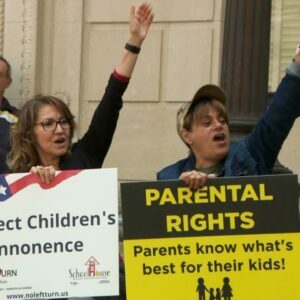For an alternate viewpoint, see “Point: Whose Children Are They, Anyway?”
As a parent of two school-age children, I know I keep up with the lessons my children are working through each week. This includes discussion, explanation, questions. That doesn’t stop with just school lessons. After all, our daily experiences offer a moving classroom to discuss life lessons.
Of course, part of that is me exercising my right to edit those lessons as I see fit. I exercise my parenting rights directly with my children daily by sharing my thoughts, inquiring with questions, and supplementing those classroom and life lessons in my own way. The parents of my children’s peers do or don’t do the same to their own degree.
However, those actions on my part don’t come from storming school board meetings, trashing or threatening school and classroom leaders, or trying to impose my worldview on the school and community at large.
The “parent’s rights” movement is not new, although it has seen a boost in visibility in the aftermath of the COVID-19 pandemic.
The topics falling under this umbrella over the decades have covered what books are in schools (and libraries), what material is taught in lessons, homeschooling, charter schools, dress code, sexual content, bathroom usage, sports participation and even the censoring of history lessons.
Parents should be involved in the education and upbringing of their children. We have that right.
While it may be my right to direct the education and upbringing of my children, it is not my right to impose my views on parenting on my child’s entire classroom, school or community.
That, sadly, is precisely what the culture warriors of the current parent’s “rights” movement are trying to do.
Instead of this polarizing tactic, a collaborative approach that includes a professional methodology, supplemented at home by the individual desires and experiences of parents, provides a solid balance for the educational outcomes of our students. This has been and continues to be happening in school communities nationwide.
The leaders of the parent’s rights movement and self-serving political actors are jeopardizing every child’s educational opportunities and experiences to serve their selfish, short-term political goals.
Again, manufactured crises are an unfortunate staple of political discourse. Still, it’s our jobs as parents and voters to sniff out this disingenuous bait and switch.
Banning books, further marginalizing the marginalized, ignoring community health orders, villainizing hard-working educators, and stripping resources from financially vulnerable school systems are not answers to parents’ natural anxieties and concerns.
Parents and educators should be partners in the quest to have students thrive. Focusing on strengthening that partnership and resourcing public schools properly is the best way to expand opportunity and get each child the direct attention they need. Making schools safe, retaining and recruiting high-quality teachers in a collaborative rather than combative environment, and addressing mental health challenges are also necessary solutions.
The actions of the so-called parent’s rights movement are actually taking away the rights of other parents to have their public school setting be a fully functional educational experience for all children. Tinkering with book bans, curriculum, and educational and safety resources affects all children. By using these tools, the manufactured “movement” has, regrettably, already succeeded in imposing less parental control in far too many communities by bullying school systems and local decision-makers.
As evidenced by poll results and results at polling places, the majority of parents and voters are not buying it. You shouldn’t either.




